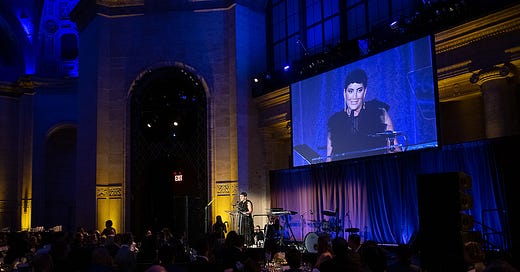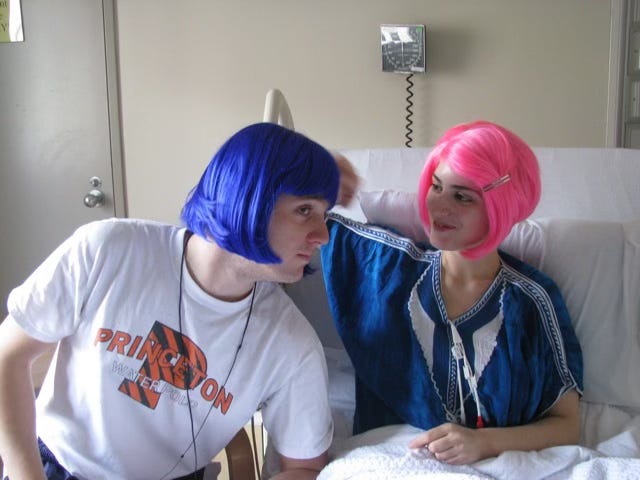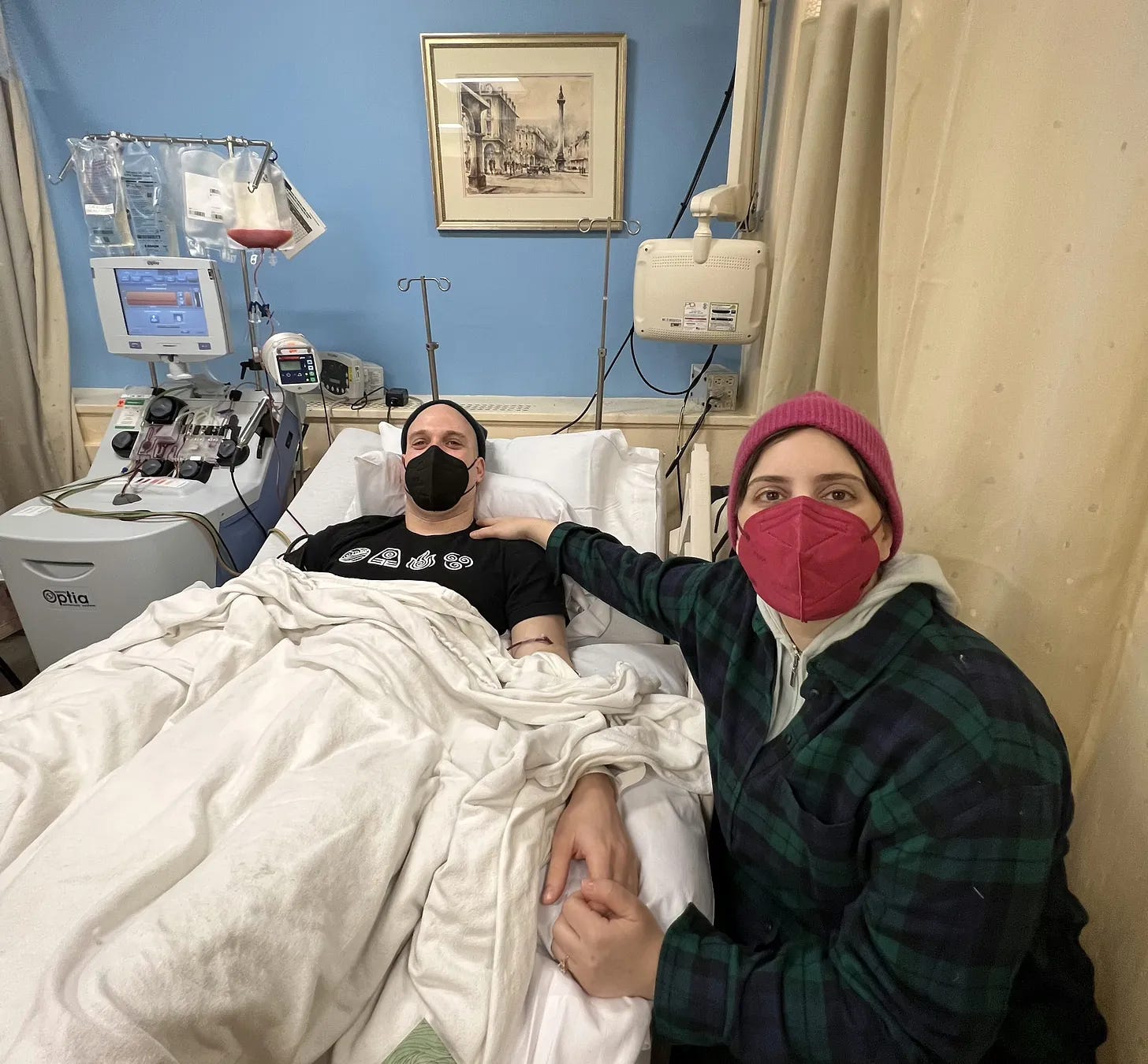Hi friend,
On Thursday, I had the immense honor of attending a gala for the Be The Match Foundation, which operates the world’s largest bone marrow registry, as the recipient of their inaugural Inspire Award. The event was held at a stunning ballroom in downtown Manhattan, and I was invited to give an acceptance speech. I have to admit, I felt a little sheepish receiving the award, surrounded as I was by a whole village of people who have given me so much. There was my transplant doctor, Dr. G., and Alli and Abbie, my transplant nurses who have been with me through this both times, and some of my dearest friends, who have shown up in all kinds of ways over the last decade. And then there was my brother, Adam, who has now saved my life by being my bone marrow donor not once, but twice. During dinner, he joked that if it happens a third time, he’s going to charge.
As challenging as it’s been, I know I’m one of the lucky ones. So many people never have the chance to get to transplant, like my friend Johnny, who was an only child of mixed ethnicity and never found a match in the registry. He died just a few weeks after his twenty-first birthday. There are so many points where access to this life-saving treatment can break down, be it the financial or geographic barriers to getting the necessary care. Along with a host of other flaws in the U.S. healthcare system (as many of you know, it’s quite a list), there’s so much work to do on those fronts. But for Johnny, the hope for a cure ended because he couldn’t find a match. There’s truly nothing more heartbreaking than that.
By expanding the bone marrow registry, so many lives could be saved. As one example, on Thursday night, we heard the story of the Keegan family from New Jersey, who were being recognized for their advocacy. They got involved with Be The Match after John Keegan, their beloved husband and father, was diagnosed with leukemia and sadly passed away. His three sons joined the registry, all hoping they’d be a match for their dad. Then in 2020, one son, Ryan, was tapped to donate to a stranger—to a woman named Debbie Giroux from North Carolina. He said yes, and Debbie is still with us today because of him.
At the gala that night, Debbie came out on the stage and, for the first time, got to meet the person who saved her life. Thankfully the event organizers had the foresight to leave small packets of tissues on every table. There was not a dry eye; the poignancy of that moment was almost elemental. This is life-saving work, and we can all play a part.
If you’re between ages 18 and 40, you can join the registry—it’s so easy, just answer a few questions about your medical history, and if you qualify, they’ll send you a little kit that you use to swab your check and then send it back. According to my brother Adam, the actual donation process is like a long blood transfusion. He says the worst part is that it takes several hours, and it’s pretty boring. Not a huge price to pay to potentially save someone’s life.
If you’re over 40, or as my hilarious friend Elizabeth Gilbert—who was miffed that she’s aged out of the donation pool—joked that night, if you have “old ass marrow,” you can support the cause in other ways. You can make a financial contribution if you have the means. Or, if you’re an experienced traveler, you can sign up to be a courier, carrying the precious donated cargo across state or international lines from donor to recipient.
Or maybe it’s as simple as forwarding this email to five people who might be willing to donate. Be The Match is looking to expand the registry in all ways, but especially in its ethnic diversity. As of now, people of color are woefully underrepresented in the registry, and Be The Match is eager to change that.
These last eighteen months, I’ve spent in a kind of fog. I sometimes still can’t believe I’m back in the kingdom of the sick—and in a more acute way than I could have imagined. When your energy is directed toward survival, there isn’t really bandwidth for anything else. But I’m just getting to a point where I have some clarity, and the thing that I keep coming back to is how grateful I am for my village—for my medical team, this community, my friends, my family, and especially my brother.
And today, after hounding him for three long years, my little brother Adam is our guest contributor. In the essay and journaling prompt below, which are so wise and powerful, he shares his experience of bone marrow donation—what it’s like, what he’s learned, and why he’d say yes again and again.
Sending love,
Suleika
Imagine a world where we have more people in the registry, of all walks of life, existing as angels for each other. —Jon Batiste
One item of note—
Mark your calendars—we’re meeting at the Hatch, our virtual creative hour for paid subscribers, on Sunday, May 21, from 1-2pm ET. It’s truly the highlight of our month, always so creatively inspiring and connected. I hope you’ll join us!
Prompt 242. A Seed of Hope by Adam Jaouad
I learned that my sister had leukemia and that I was her only hope for a cure in the same conversation. At the time, I was in college, studying abroad in Argentina. I knew Suleika was sick, and that she’d left Paris for more testing back home in New York, but I didn’t know how serious it was. When they told me over a crackly Skype connection, I was in shock. Then they started sharing the statistics: that the chance of me being a match was 25%, and even if that was the case, there was only a 35% chance of survival. In my head, the odds started compounding. Numbers like that, they’re so harsh, so stark.
There was no question about what I’d do next: I immediately flew home, and I did all the tests. When we learned I was a 10/10 match—meaning the markers that the immune system uses to determine which cells do and don’t belong in the body all matched up—we literally jumped for joy. It felt good to help in a concrete way. One of the things about a cancer diagnosis is that there’s a whole community of family, loved ones, and friends who want to help, to be of service, to gain some control in an uncontrollable situation. They’re acting out of love, but they can’t always contribute in a way that’s actually helpful. Having a clear role and purpose in the process was comforting.
But it was also complicated. Along with purpose, I felt a sense of responsibility and started putting pressure on myself. I thought, It’s my bone marrow. If it doesn’t work, I’ll never forgive myself. These thoughts weren’t logical or reasonable, but nonetheless, that was where my mind went. And it was only when Suleika’s five-year bone marrow biopsy came back clean, and she was demonstrably and markedly improved and healthy, that the fear of failure diminished to the point that I finally began to think of it as a success.
And then, of course, that changed. I’m a middle school teacher, and I got the call about Suleika’s leukemia relapse just before the first evening of parent-teacher conferences. It had been a decade since that first transplant, and I was at a very different point in my life. When I was 21, some aspects of immaturity protected me. In some ways, I was more self-centered; I didn’t give too much of myself. The second time was harder. Suleika had worked so hard to recreate her life. She had rebuilt on ruins, something so strong. For this to happen not once, but twice—it was devastating for all of us. I should have taken some time off, but I compartmentalized it, and I got through three days of parent-teacher conferences.
By Friday afternoon, I was the sickest I’ve ever been. The stress was too much. It was an important reminder not to shove things down, but to externalize those complicated feelings like fear and grief and powerlessness.
That last one was more prevalent for me the second time, because in the initial discussions, the doctors said I wasn’t a valid donor. They thought if they used my bone marrow again, it would likely lead to the same outcome—relapse. But since our ethnicity is mixed and uncommon (our mother being Swiss, our father Tunisian), and since matches are much more likely between people who share a similar ethnic background, there wasn’t a match in the registry. It very quickly became evident that, once again, my bone marrow was the best hope.
There were moments this second time that the negative thoughts returned. It was almost like a part of me never let go of the idea it was going to fail. Yes, it got smaller over time, but then it all exploded up inside of me again. Thoughts like, This is my fault, or that my bone marrow wasn’t good enough. But Suleika completely reframed it. “You gave me time,” she said. “You gave me ten years.”
Both times I donated, I didn’t feel like I had a choice—which is to say, my natural reaction was to say yes. I’d say yes every time, whether for Suleika or for a stranger, because I’ve seen the impact. When you find a match, from that moment on, there’s a light. There’s a chance. Cancer treatment is a brutal process, like salting the earth and hoping something can grow from that ruined soil. And my bone marrow, and maybe yours, could be that seed of hope.
Your prompt for the week:
Make a plan to plant a seed of hope. Maybe it’s joining the bone marrow registry, or encouraging your friends or loved ones to join it. Maybe it’s donating blood on a regular basis. Maybe it’s checking in with a friend who is struggling. Write about how your particular gifts or abilities could help nurture new growth.
If you’d like, you can post your response in the comments section, in our Facebook group, or on Instagram by tagging @theisolationjournals.
Today’s Contributor—
Adam Jaouad is far too humble to write his own bio, so let me brag on him for a moment: A graduate of Skidmore College, Adam Jaouad is a middle school science and math teacher at an international school. He’s much beloved by his students, who often say he’s their favorite teacher ever. They also say he’s “corny-funny,” which means lots of dad jokes. He speaks French, Spanish, and English fluently, has an encyclopedic knowledge of history, and is passionate about board games and staying active. A two-time bone marrow donor (pictured here during his second donation), Adam wants you to join the bone marrow registry so you have a chance of being the match.
Be The Match, a nonprofit operated by the National Marrow Donor Program, operates the largest and most diverse bone marrow and umbilical cord blood unit registry in the world. In 2022, the Be The Match Foundation facilitated over 7,000 transplants and cell therapies for patients with blood disorders, and provided $6.1 million in grants to patients and their families in need of financial assistance.
There are a number of ways to lend your support to this life-saving mission. You can:
Join the registry, if you’re between the ages of 18-40. It’s so easy, all it takes is a cheek swab!
Donate financially to help patients get the care and support services they need.
Encourage friends and loved ones to join the registry by sharing this email far and wide!
To this day I am amazed and in awe of someone who would donate their cells to save the life of a complete stranger. —Michael, transplant recipient













Dearest Suleika,
Once again I am reaching out to you with a full and breaking heart.
I remain deeply attached to your journey, and was so moved by what Adam has written.
My husband, Michael Brecker, received a haplo- identical transplant with my daughter’s cells, which sadly did not work. She won’t discuss it with me, but I can only imagine the pain she must live with, feeling like she wasn’t able to save her father’s life. Adam was so articulate about the wide array of feelings surrounding being a donor. Please thank him for me, for his honesty and bravery.
I continue to send you love and light from afar. When I was with our mutual doc friend Sid recently, we lovingly spoke about you.
It was a warm connection to you.
Yours in gratitude,
Susan
Bone Marrow Registry- by now my age has opted me out. However, in the dark ages I did try to be a match for my brother Roy. For what ever reason it was not a go and he had an experimental Autologous transplant (details vague) for Multiple Myeloma. After his transplant at Dana Farber, I had truly an honor to be on that amazing unit-where I saw miracles happening- rebirths- children awaiting a Mother to return-no greater gift.